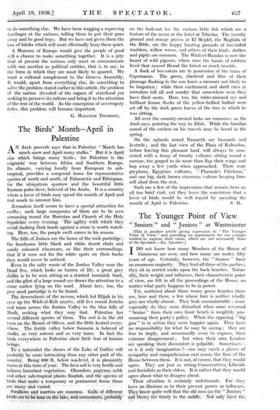The Birds' - Month—April in Palestine .
A N Arab proverb says that in Palestine "March has -EX- much snow and April many stalks." But it is April also which brings many birds ; for Palestine' is the migrants' way between Africa and Southern Europe. Its climate, varying locally from European to sub.. tropical, provides a congenial home for representative species of north and south,- of Palaearctic and Ethiopian, for the ubiquitous sparrow and the beautiful little Eastern palm dove, beloved of the Arabs. It is a country where a lover of birds may spend the month of- April and find much to interest him.
Jerusalem .itself seems to- have a special -attraction for swifts ; such large companies of them are to be seen screaming round the Muristan and Church of the Holy Seindehre every; "eVening. ' they avoid dashing their heads against a stone is worth watch- ing. Here, too, the purple swift comes in his season. - - The hills of Judaea are the home of the rock partridge, the handsome little black and white . desert chats and sandy coloured wheatears, so like their surroundings; :thEit if it were not for the white spots on their backs they would never be noticed. .Even in the salty waste of the Jordan Valley near the Dad Sea, .which looks. so barren of life, a -great grey shrike is to be seeii sitting on a stunted tamarisk bush,' and the glintof a large round eye draws the attention to a stone curlew lying on the marl. About here, too, the grey. 4arict partridge is to be found. The descendants of thev :raens, which fed Elijah in his Cave up the Wildf-el--Iteft nearby, still live round Jericho and: ream across the Jordan Valley to the blue hills of Moab, Seeking what they may find. Palestine has several different. species of them. The Owl i in the Old trees on the Mount of Olives, and the little kestrel every- _ The fertile valley below Samaria is beloved' of so -Very; Solenin and so very -tame.' In fact the birds eVerYWhere in Palestine show- little fear of htinian. . . . . beings. - To a-liatiiialist the shores of the Lake of Galilee will Probably' be More interesting than any other part of tfic- eoinitry; Being 686 ft. below --sea-level, it is pleasantly- warm at this time of year. The lava soil is- Very fertile and induces luxuriant' vegetation. Oleanders, papyrus;'-nebk vat Other sub-tropical-plants flourish, and theripecies of birds that make a temporary or permanent home there are-Many. and -varied. ' • • ' ' 'S'imllows and martins are common. Gulls of different kind-are to be Seen on the lake; and cormorants,- probably on the look-out for the Curious little fish which are a feature of the menu at thehotel at Tiberias. The marshy ground and orange groves at El Mejdel, the Magdala of the Bible, are the happy hunting grounds of fan-tailed Warblers; willow wrens, and others of their kind; shrikes and pipits are common. The Wildi-el-Hamitm is now the haunt of wild pigeons, where once the bands of robbers lived that caused Herod the Great so much trouble.
A flock of bee-eaters are in possession of the ruins of Capernaum. The green, chestnut and blue of their plumage flashing in the sun leave a memory not likely to be forgotten ; while their excitement and shrill cries at intruders tell all and sundry that somewhere near they have their nests. Here, too, the white-rimmed eye and brilliant lemon flanks of the yellow-bellied bulbul were set off by the dark green leaves of the tree in which he was sitting. All over the country crested larks are common; as the Arab says, pointing the way to Allah. While the familiar sound of the cuckoo on his travels may be heard in the spring. On the uplands round Nazareth are buzzards and kestrels; and the last view of the Plain of Esdraelon, before leaving this pleasant land, will always be asso- ciated with -a troop of _twenty vultures sitting round a carcase, too gorged to do more than flap their wings and hop 'away a few yards when approached. There were gryphons, Egyptian vultures, " Pharaoh's- Chickens," and one big, dark brown cinereous vulture keeping him- self aloof from the rest.
Such are a few of the impressions that remain from an all too brief -visit, yet they leave the conviction that a toter of birds would be well repaid by spending the










































 Previous page
Previous page